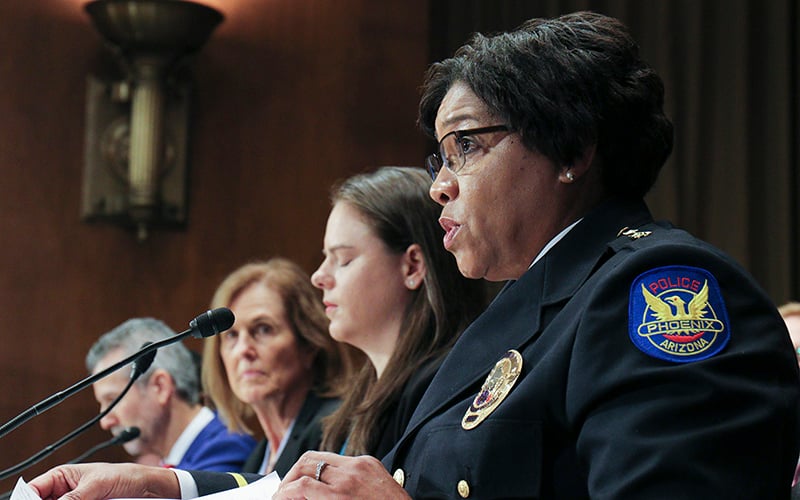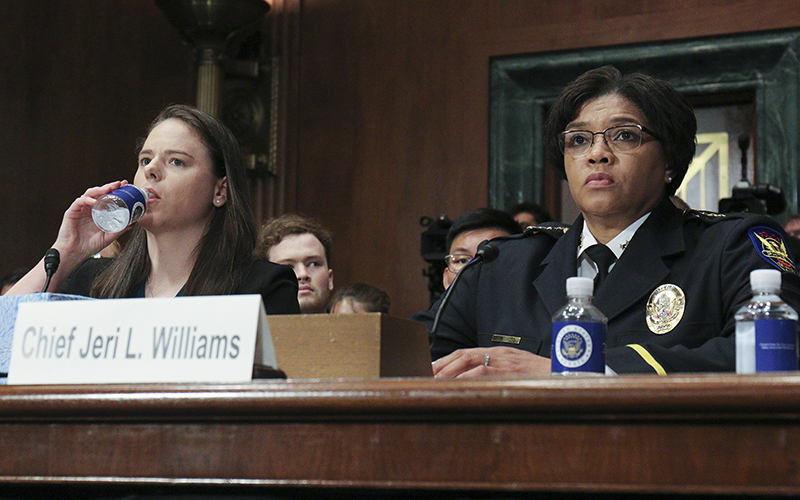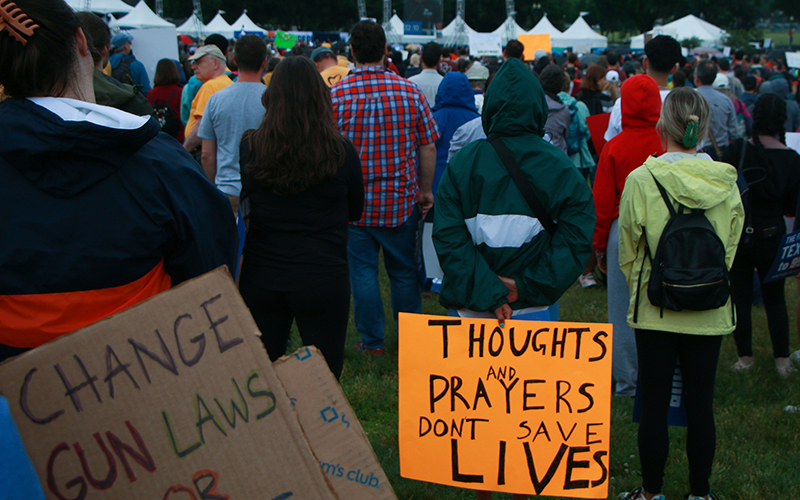
Phoenix Police Chief Jeri Williams was one the witnesses at the Senate Judiciary Committee’s hearing on protecting children from gun violence. She said gun-reform is needed as well as resources for police. (Photo by Neetish Basnet/Cronkite News)
WASHINGTON – Phoenix Police Chief Jeri Williams urged senators Wednesday to devote more resources to law enforcement agencies to help fight the rising incidents of gun violence among youths.
“We do need responsible gun legislation. We do believe that there should be a ban on assault weapons and high-capacity magazines in order for us to properly serve and protect our community,” Williams said in testimony to the Senate Judiciary Committee.
But Williams, who was testifying as president of the Major Cities Chiefs Association, added that in addition to “commonsense” gun reforms, funding is also needed to support police departments that are “out-gunned, we’re out-manned, we’re out-staffed.”
The hearing comes as the House and Senate are considering competing gun-reform bills in the wake of a mass shooting in Buffalo, New York, that killed 10 people and another at a grade school in Uvalde, Texas, that killed 19 schoolchildren and two teachers.
The calls for action pushed the House to pass a pair of bills last week on largely party-line votes.
One bill would create a national “red-flag law,” that lets courts order the confiscation of weapons from people who pose a danger to themselves or others. The second includes a number of provisions aimed at curtailing the use of “ghost guns,” tightening gun-trafficking rules, raising the age to buy semiautomatic weapons to 21, restricting large-capacity magazines and more.
Over the weekend, a group of bipartisan senators put forth their own compromise proposal that would encourage states to implement red-flag laws, increase funding for school safety for school safety and mental health programs, and toughen background checks for buyers under age 21, among other provisions.
While the Senate bill is not as tough as the House measures, it has the support of 10 Republican senators, which should be enough to get it through the Senate.
There was little apparent disagreement among senators or witnesses at Wednesday’s hearing. Committee members on both sides of the aisle showed support for the bipartisan Senate framework and agreed with Williams and other witnesses on at least some of the needed actions.
Sen. Ted Cruz, R-Texas, focused on better equipping police to respond to shootings.
“We keep having the same vulnerabilities and not fixing them,” Cruz said. “Repeatedly I’ve introduced legislation to provide funding to put security equipment on campus. And the most important security tool we can have is armed law enforcement on campus.”
But while Cruz attributed gun violence to “bad guys,” and said the focus should be on criminals, felons and fugitives, Williams pointed out that guns have become more readily available.
“Guns have flooded our communities, and it has become far too easy for our children to get their hands on them,” Williams said.
According to data from Gun Violence Archive, there have been 680 unintentional shootings so far this year across the U.S., more than double the 311 murders or suicides this year.
Sen. Alex Padilla, D-Calif., said most of the recent gun violence incidents are carried out by untraceable “ghost guns” and assault weapons, which he said calls for stiffer federal regulations.

Phoenix Police Chief Jeri Williams, right, and Heritage Foundation legal fellow Amy Swearer were among the witnesses at the Senate Judiciary Committee’s hearing on protecting children from gun violence Wednesday. (Photo by Neetish Basnet/Cronkite News)
Padilla said that calls for better mental health have been used in the past to “distract from the gun-safety side of the conversation.” But he said he supports the focus on mental health solutions included in the Senate compromise bill.
“The parents of the children who died are going to need help. The children who survived are going to need help. The teachers who survived are going to need help,” Padilla said. “The whole community is going to need ongoing help. We need as many resources in all areas.”
Williams welcomed any additional mental health resources, saying police departments cannot be expected to do it all by themselves.
“The blue suits, or blue uniforms, or whatever color uniforms officers are wearing are not the right uniform to respond to a mental health crisis,” Williams said. “That’s why communities – churches, faith-based, you name it – we need those resources available to keep the law enforcement officers available and accessible for violent crime issues.”
Williams said immediate actions are needed to combat gun violence and stop it at its roots.
“The rise in shootings by juveniles has created a vicious cycle,” Williams said. “Today’s suspect is often tomorrow’s victim and vice versa.”
She was one of five witnesses, which included a pediatrician, a friend of a gun violence victim, a school safety advocate and a legal expert. All echoed the need for a broad-based response to gun violence.
“We’re watching as their futures and their lives vanish. We are losing our kids,” said Amy Swearer, a legal fellow at the Heritage Foundation, in her testimony. “And if we don’t act soon to stem these problems at the source, it won’t just be the kids that we’re losing. We will lose an entire generation of adults as well.”

